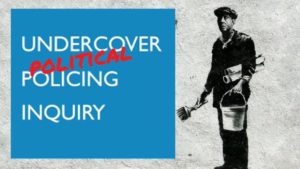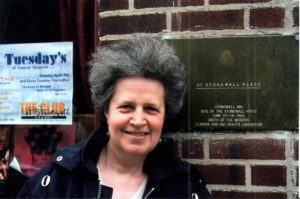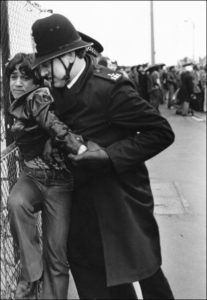UCPI Daily Report, 9 May 2022
Tranche 1, Phase 3, Day 1
9 May 2022
 Proceedings opened today in the third round of evidential hearings in the Undercover Policing Inquiry, with statements from the Inquiry’s lead barrister, David Barr QC, and lawyers representing the Metropolitan Police Service and individual undercover officers.
Proceedings opened today in the third round of evidential hearings in the Undercover Policing Inquiry, with statements from the Inquiry’s lead barrister, David Barr QC, and lawyers representing the Metropolitan Police Service and individual undercover officers.
Also released were statements from several non-state witnesses, summaries of which can be found below.
Hearings will continue tomorrow with statements on behalf of the Home Office and representatives of some of the victims of police spies, including the statement of Charlotte Kilroy QC which featured heavily in the comments made today.
COUNSEL TO THE INQUIRY, DAVID BARR QC
The opening statement from the Inquiry barrister, David Barr QC, was long and detailed, for a large part summarising some of the evidence the Inquiry is releasing today. However, it did highlight further disturbing evidence of the scale and extent of wrongdoing by these undercover units.
In addition to the deliberate targeting of school children campaigning against the far right, seemingly at the behest of the Security Service (aka MI5), Barr cited a Special Branch memo that shows police were involved in passing information about trade union activists to private companies:
“some employers plead to be given warning if known agitators seek or obtain employment with them… when a Special Branch officer is himself seeking help from an employer, or from a union official, it is asking a good deal to expect him to insist invariably that he is engaged in a one-way traffic.”
The Inquiry also highlighted an MI5 report pointing out the dangers of vetting amounting effectively to blacklisting:
“The transmission of security information to an employing authority can have serious consequences for the person concerned, leading in extreme cases to purge from the Civil Service or, in other cases, to denial of access to classified information which can have an adverse effect on careers.”
Considerable attention was paid to the relationship between the Metropolitan Police’s undercover political policing unit the Special Demonstration Squad (SDS) and MI5. Though complex and changeable, their interaction was involved, and it is clear that the latter was highly influential on spycops’ reporting and activities.
Barr also cited Special Branch annual reports, noting that over five thousand files were opened, mostly on individuals, and over a million entries were made in Special Branch files in 1979 alone.
His statement notes that:
“the SDS reported on the activities of black justice campaigns and infiltrated far left groups which, amongst other things, actively promoted racial equality. SDS reporting on such matters formed a part of a wider Special Branch interest in racial tension”
Barr spent some time on the context of the SDS within Special Branch and how it related to the Security Service and the Home Office, including what defined the undercover unit’s reason for existence – particularly the definition and interpretation of subversion.
Though dry and historical, this will no doubt be of significance for placing any conceivable justification of the SDS in a wider context.
In particular, Barr highlighted the kind of rhetoric the police spies used about their targets and pointedly asked:
“Were revolutionaries behind and exploiting every public demonstration, ‘pop’ festival, or squat or sit-in? Or were Special Branch, even allowing for risks to national security generated by the Cold War, looking for Reds under the bed? Was SDS reporting for public order purposes, in all the circumstances, invaluable?”
He also summarised the results of recent secret, closed hearings where the Inquiry heard further evidence from undercover officers that included candid accounts of sexual relationships officers had with their targets.
This included the use of sex as an operational tactic, and the recognition that the women would not have consented if they had known they were sleeping with a police officer, as well as accounts that certain officers were known by colleagues to be “sexual predators”.
One undercover undermined the manager’s position of claimed ignorance, referring to Rick Gibson, known to have had multiple relationships while undercover, saying:
“Rick had a certain reputation and it gradually came out that he had had a sexual relationship which led to his being compromised, and that was, to my way of thinking, generally well known among the existing SDS officers.”
Finally, in recognition of the fact that the massive delays that have plagued the process have left victims without answers for too long, the Inquiry announced their intention to produce an Interim Report at the end of this first tranche of evidence. The scope and timing of that report are still to be decided.
COORDINATED STATEMENTS FROM THE MET & EX-UNDERCOVER OFFICERS

Peter Skelton QC
In surprisingly defensive and clearly coordinated opening statements, lawyers representing the Met and the designated lawyers for over 100 individual ex-undercover officers claimed that it would be ‘unfair’ to judge the activities of the Special Demonstration Squad without hearing from the officers and agents that the SDS gathered the intelligence for.
Peter Skelton QC, representing the Metropolitan Police Service (MPS) suggested the Inquiry should not seek to establish whether the early years of police spying on political groups were justified (despite this being a key part of the Inquiry’s terms of reference), saying that it is “inherently problematic and unfair”.
He went on to say:
“If the Inquiry does intend, however, to make findings about the justification and value of SDS deployments into specific groups, or its reporting on specific individuals, during in the T1 period, then this can only be done fairly by asking former officers of MPSB [Met Police Special Branch] C Squad, A8 Uniform Branch, and the Security Service, directly to explain the justification for seeking intelligence on those groups and individuals, and what value the resulting intelligence had to their work.
“They should also explain why intelligence needed to be sought using undercover deployments, rather than by some other means – for example, open sources such as public meetings and publications, or alternative closed sources such as informants and surveillance.”
This echoes the long-standing demands of campaigners and core participants for a fuller investigation into where ultimate responsibility for the activities of Britain’s secret political police lies.
However, it also reflects a recognition by police core participants in the Inquiry that their undercover operations are difficult (if not impossible) to justify based on any of the evidence they have been able to provide so far. It seems they now wish to imply they were just following orders, and to pass the buck for decision making and justification of the operations further up the chain.
Both former undercover officers (represented by Oliver Sanders QC for their opening statement) and the Met make clear in their statements that the SDS was by no means an autonomous policing unit; it produced intelligence for “customers” on request.
The Met noted the huge volume of reports the SDS provided to the Security Service, often in response to specific requests, while the officers’ lawyers specifically claim that it was the Security Service who were seeking information on school children and that is why the SDS filed those reports.
Far from offering any justification for the operations, both statements raise extremely worrying questions about the extent to which even deeper, darker secret agencies have been allowed to subvert policing resources into unlawful and anti-democratic activities that had no possible legitimate policing end.
WHOSE HISTORY?
Both the Met and ex-undercover officers also repeated calls to know what relevant books the Chair is reading and for “independent, neutral, expert witnesses” to be called to give evidence about the historical context of the time.
They back up their somewhat disingenuous claim that such evidence could be neutral, by claiming that “history is an academic discipline and historians observe certain ethical and professional requirements” but go on to cite Christopher Andrew, the author of ‘Defence of the Realm: The Authorised History of MI5‘ as one such possible ‘objective’ expert.
Overall, they appear very concerned that, by present day-standards, what they did is clearly abhorrent, and they seem to hope putting it into the historical context of the sexist, racist policing of the 1970s (like a real-life episode of ‘Life on Mars’) might lead to them being judged in a more favourable light.
SPYCOPS STEALING DEAD CHILDREN’S IDENTITIES
The issue of undercover officers stealing dead children’s identities also came up. Both barristers apologised again for the practice but were keen to point out that it wasn’t really the SDS’s fault. They want Mitting to look at where the practice originated, citing a variety of earlier examples, including the fact it was used by other agencies such as the KGB. Their worry is that the SDS will get all the blame for this ghoulish practice.
Skelton also added that the Security Service had a way of tracking when dead children’s identities were being stolen to generate false passports; this is the first we have heard of this.
At the end of Skelton’s statement, Mitting addressed some of the points he had raised.
He did not accept that the theft of dead children’s identities should be investigated more widely. He was focused on the SDS and was not investigating the Security Service, and he rather pointedly warned the police that they may not want to compare their own practices to those of the KGB:
“I can’t believe that you would want us to think that the KGB were the inspiration for the practice of a domestic police force. I think the less said about that the better, no?”
As far as he was concerned, he did not need the assistance of a historian as during the period the Inquiry covers he was a ‘sentient adult’ interested in political affairs and he feels he is already aware of the political and social circumstances of the time.
If he needs any further information on a particular aspect, he can ask a witness, as, he says, he did in his previous questioning of Tariq Ali on the nature of Trotskyism. He also recognised that historians themselves have widely differing perspectives.
He was equally scathing of the request to let core participants know all the books he had read. Saying that he had a library of over 300 books, he was not going to catalogue them all, or put into the public domain every bit of evidence that had formed his understanding. He was happy to have reading material suggested to him, though.
To his mind, the most useful material he could get were the documents themselves; with most of the senior officers from A8 and the Security Service deceased, that would be his best source – if those documents exist. Apparently, despite calling for the evidence, the Met do not know where their own material, such as the risk assessments sent to A8, might be found…
However, though Mitting is not going to call on junior officers still alive, as they would not have had the full picture either, he is going to ask those who can help to do so.
Nobody pointed out that the Met are actually calling for evidence that only they can provide, and so far have failed to do. In fact, they have produced very little evidence that could put their boys in the SDS in a good light.
WERE SPYCOPS EVEN LEGAL?
The final issue he addressed arising from Skelton’s arguments was the issue of the lawfulness of the SDS itself. This has been raised by Charlotte Kilroy, QC on behalf of the women targeted for relationships – whose statement will be heard tomorrow. Kilroy has advanced a powerful set of arguments challenging the foundation of undercover policing.
Both Skelton and Sanders were clearly worried by this and sought to head some of the arguments off at the pass. Sanders spoke a lot about the ‘values’ and ‘context’ of the 1970s in his defence, and raised the point that it would also affect the likes of MI5, MI6 and GCHQ.
Mitting responded that the main issues of lawfulness to his mind related to whether undercover police had the right to enter private homes as part of their work and the distribution of confidential information such bank details without a warrant.
He is open to further submissions on these points which go to the heart of all activities of the undercover policing units, and it is expected Ms Kilroy QC will go deeper into these issues tomorrow at 12:15pm.

Oliver Sanders QC
Oliver Sanders QC, speaking for the undercover officers themselves, following Mitting’s response to Skelton, was left floundering. The goal posts have not only been moved but the ball has been taken away, he plaintively complained.
His statement clearly showed the SDS are worried they will take the brunt of the blame for the egregious behaviour even though other spies were also at it. He echoed much of Skelton’s points where he could.
Where he did expand on something new, was the request for expert advice from a psychiatric analyst. He was keen to suggest that this would shed light on the undercovers’ activities and give necessary context.
Mitting said no, there is sufficient material on the subject from the 1990s and 2000s, and Sanders’s suggestion went beyond what was reasonable to expect of the Inquiry.
As far as he was concerned, it was already obvious that being undercover had adverse impacts on some of the officers. He also pointed out that if we are going to talk about psychological damage, he would have to investigate the damage done to the victims of the police spies.
ADDITIONAL STATEMENTS
In addition to the oral statements reported above, written statements were also published on the Inquiry website today on behalf of Diane Langford, John Rees and Joan Rudder
DIANE LANGFORD ON THE IMPORTANCE OF SPECIAL BRANCH REGISTRY FILES

Diane Langford, New York City, 1996
Diane Langford was active in the Britain Vietnam Solidarity Front, set up the Women’s Liberation Front, was the partner of Maoist leader Abhimanyu Manchanda, and gave a strong statement during the last set of hearings in May 2021 (and also wrote up how she got involved in the Inquiry).
This year, she submitted an additional statement after finding out that the Metropolitan Police held more information on her, which the Inquiry had failed to find even though it was right in front of them. The Inquiry has something to learn here, from a core participant who would not take no for an answer.
Langford submitted a Subject Access Request to the Metropolitan Police for her Registry File. And, quite extraordinarily, she got it. The 12 pages provided is a heavily redacted copy of her personal file opened by Special Branch, the ‘history sheet’ listing the dates that information was added, and what it entailed.
Unsurprisingly, the Inquiry refused to provide her with all the included reports, saying such was “not proportionate” (read: too much work). Langford subsequently asked for the material linked to 12 specific Registry File entries to which the Inquiry agreed.
They subsequently identified two reports she had not seen previously, but said they did not consider it necessary for her to get them before the current hearings.
Clearly, the history sheet complements the disclosure provided to date by the Inquiry, Langford says:
“It seems to me to be a very simple and proportionate way to identify relevant reporting.”
As it appears to give a more detailed picture of the undercover deployments, she has some useful advice for Mitting:
“If other civilian witnesses are provided with their own history sheets it could help them to assist the Inquiry in its investigations significantly.”
Langford also concludes that the decision to open a Registry File on her was made largely as a result of SDS intelligence. What if the Britain Vietnam Solidarity Front had not been infiltrated in the first place?
This is an important issue for the Inquiry to keep in mind. Infiltrating groups on the left becomes a self-fulfilling prophecy: because a spycop is planted next to you, you get ‘mentioned’ in their reports on a regular basis, and a certain amount of ‘mentions’ would become a reason to open a personal file.
The formal designation as ‘a person of interest’ has significant implications, Langford states, blacklisting being an obvious example.
“Did the opening of my Registry File lead to other agencies opening files on me? Did it lead to trade union ‘blacklisting’ agencies spying on me at work?”
Diane Langford has every right to ask these questions, as her Subject Access Request also revealed some heavily redacted reports (not released) on her separation from Manchanda, her union activities, and even on the books she took to work: “frequently seen reading Maoist literature.”
Langford finds this particularly disturbing:
“a clear example of thought policing… how on earth did this information end up in a Special Branch report?”
She wants the Inquiry to tell her who produced the reports and who the information was collected for.
Langford is now 80 years old, and yet the state still holds files on her based on her attendance at political meetings over half a century ago. Her own research has brought to light yet more discrepancies in the work of the Inquiry. It turns out some of the reports listed on her Registry File have been disclosed by the UCPI before, but do not name her. How did the information that she attended end up in her file?
Last but not least, the history sheet of her personal file ends in 1984, and she wonders if this is because Registry Files were computerised in the mid 1980s.
“As I said in my first statement, given that I am as politically active now as I was then, I find it extremely unlikely that the surveillance of me has ever stopped and feel that this is something that is relevant for the Inquiry to investigate.”
CONFRONTING FASCISTS ON THE STREETS – REES AND RUDDER

Police arrest youth in Southall, April 1979
Joan Rudder and John Rees were anti-fascist activists in the late 1970s.
Rudder worked for the Anti-Nazi League in London and had been present at the ‘Battle of Lewisham’ in August 1977, when the fascist National Front had been confronted and repelled by a huge number of people.
Rees took part in a demonstration in Southall, south London, on 23 April 1979 to protest against a march of the National Front. This protest became notorious after anti-fascist protester Blair Peach was killed by police.
Rees lived with his parents and came to London specifically for the day. He had been active in the Socialist Workers Party at Hull University, but attended this demonstration alone.
The questions the Inquiry asked of these two witnesses were quite revealing, exposing the context of the investigation. The Anti-Nazi League (ANL) and the Socialist Workers Party had put out calls to attend the demonstration, and it seems the Inquiry still hopes they can be held responsible for organising riots. The Inquiry relentlessly probed this line, asking:
“Did the ANL use violence to advance its aims? Did the ANL foresee a time when violence would or would be, necessary to realise its aims? Did the ANL advocate, provoke or approve of public disorder in order to advance its aims? Did the ANL consider it necessary to break the law to advance its aims? If so, please explain.”
Both were asked about the violence they witnessed, and both give convincing and detailed accounts of how the police were responsible for most if not all confrontations.
Joan Rudder recalls how she saw many wounded people, most having been beaten on the head. After the police refused them access to the ambulances, she accompanied them to a house made into a make-shift medical centre.
However, they were not allowed to stay there until things had quietened down. They were forcibly evicted:
“As we exited the house we went along a path to the gate, which was obviously open, the police had stationed themselves either side. I am guessing 6 or 8 officers were either side with truncheons drawn ready.
“As we went through the gate we were attacked and beaten. I was beaten on the crown of my head, my head split open. I have got six stitches and the hair has never grown back.”
“My long lasting memory of this event was that the police were out of control. Without doubt. The people I was standing with, nobody had any weapons or anything that could be used as a weapon.
“On the counter demonstration we were being herded around by the police. Their whole mobilisation was to deny our right to peacefully protest, they had riot shields, they were out with the horses, they had their batons drawn and they were long batons they weren’t short ones. Someone somewhere must have authorised their use.”
In this context it is worth repeating the reference made by Barr QC in his opening statement today to secret evidence heard by the Inquiry in closed hearings.
An undercover officer, HN41, was present at the demonstration at Southall at which Blair Peach died, even though his managers had some reservations about him attending “because uniform police were going to clamp down on the demonstrations”. This quite clearly suggests that the police violence in Southall that killed Blair Peach had been planned in advance.
The current round of Undercover Policing Inquiry hearings, focusing on Special Demonstration Squad managers 1968-82, continue until Friday 20 May.
<<Previous UCPI Daily Report (13 May 2021)<<
>>Next UCPI Daily Report (10 May 2022)>>
